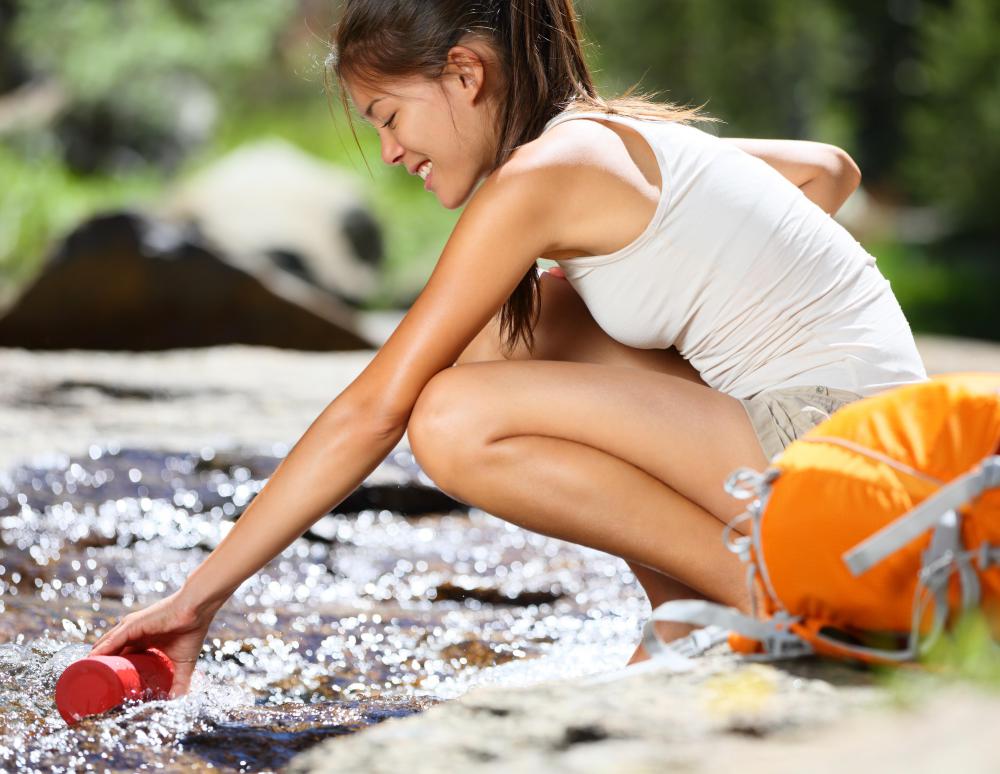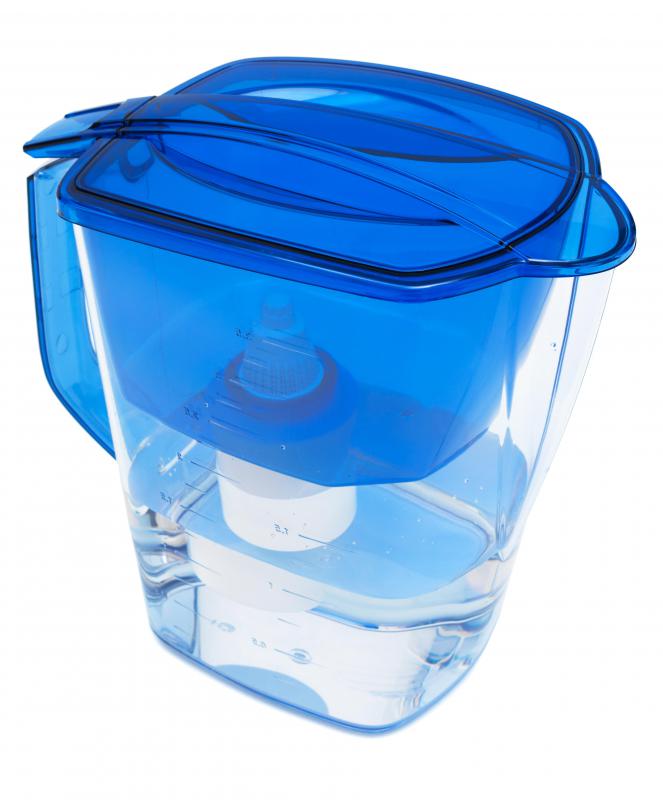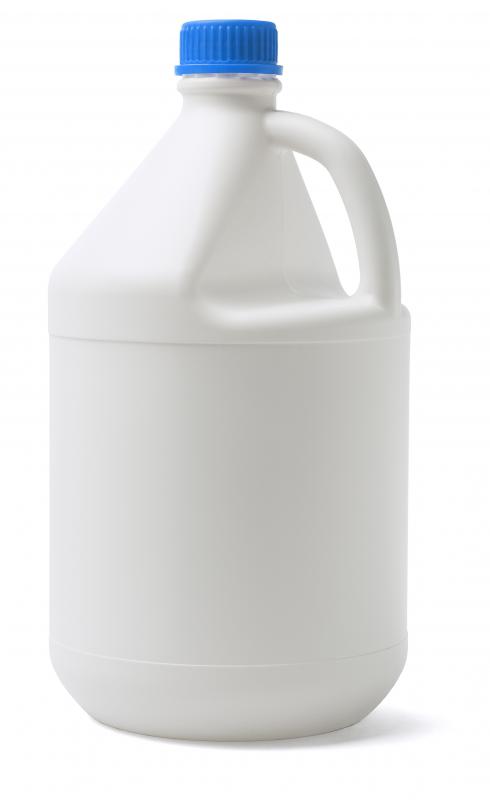At AllThingsNature, we're committed to delivering accurate, trustworthy information. Our expert-authored content is rigorously fact-checked and sourced from credible authorities. Discover how we uphold the highest standards in providing you with reliable knowledge.
What is Potable Water?
Potable water is water which is fit for consumption by humans and other animals. It is also called drinking water, in a reference to its intended use. Water may be naturally potable, as is the case with pristine springs, or it may need to be treated in order to be safe. In either instance, the safety of water is assessed with tests which look for potentially harmful contaminants.
The issue of access to potable water is very important. In developed countries, people may not put a great deal of thought into the source of their water. In many First World nations, citizens can turn on a tap for fresh, potable water which may also be enriched with substances for health. In developing countries, however, and especially in Africa, a large proportion of the population does not have access to safe water.

Water which is not safe to drink can carry diseases and heavy metals. People who consume this water will become ill, and there is a risk of death. Unfortunately, even in areas where the water is known to be unsafe, people may drink it anyway, out of desperation. The lack of potable water is often accompanied by other lapses in sanitation, such as open sewers and limited garbage collection. Many of these public health issues impact the poor more than anyone else.

Water which is contaminated can be treated to turn it into potable water. One of the easiest ways to treat water is boiling. Boiling water may not remove heavy contaminants, but it can neutralize most bacteria and viruses which may be present. Water can also be treated with chemicals such as bleach, which sometimes come in the form of tablets for field and camping use. In addition, water can be pumped through a filter to remove particulates.

Because water quality is important, many nations strive to protect the safety of their water and to increase access to potable water. Some countries have laws governing water safety, with severe penalties for polluters. These nations typically test water on a regular basis for contaminants, making the results of this testing available to citizens by request. In developing nations, many non-governmental organizations (NGOs) are working to improve water quality conditions, along with other basic sanitation.

Even in first world countries, after a major disaster, access to potable water may be limited. People in this situation can look for potable water in hot water heaters and toilet tanks, and they should save this water for drinking. For bathing and cleaning, non-potable water can often be used. Keeping purification tablets on hand in an emergency preparedness kit is also an excellent idea. After major storms and hurricanes, citizens should wait to be assured that their water is potable, in case sewage pipes have ruptured and contaminated the water supply.
Frequently Asked Questions
What exactly is potable water?

Potable water is water that is safe for human consumption, free from contaminants and pathogens. It's treated to meet drinking water standards set by health authorities, ensuring it doesn't pose any health risks when used for drinking, cooking, or personal hygiene. Potable water is a cornerstone of public health, preventing waterborne diseases and promoting overall well-being.
How is potable water treated to ensure its safety?

To ensure safety, potable water undergoes several treatment processes, including filtration to remove particulates, and disinfection to kill harmful microorganisms. According to the World Health Organization, treatments often involve the use of chlorine or ultraviolet light. These processes are rigorously controlled to meet strict quality guidelines before the water reaches consumers.
Can I make non-potable water potable at home?

Yes, non-potable water can be made potable at home through boiling, chemical disinfection with chlorine or iodine, or using a water filter designed to remove pathogens. The Centers for Disease Control and Prevention (CDC) recommends boiling as the most effective method for ensuring the safety of drinking water in the absence of commercial treatment.
What are the risks of drinking non-potable water?

Drinking non-potable water poses significant health risks, including exposure to bacteria, viruses, parasites, and chemical pollutants. These contaminants can lead to serious illnesses such as cholera, dysentery, and typhoid fever. The Environmental Protection Agency (EPA) warns that vulnerable populations, like children and the elderly, are particularly at risk from unsafe water.
How can I tell if my tap water is potable?

You can determine if your tap water is potable by checking for any unusual taste, odor, or discoloration, which may indicate contamination. However, some contaminants are undetectable by senses alone. It's best to review the annual water quality report provided by your local water supplier or have your water tested by a certified laboratory for assurance.
Is bottled water always considered potable?

While bottled water is generally considered potable and safe for consumption, it's subject to different regulations than tap water. The Food and Drug Administration (FDA) oversees bottled water standards, which must provide protection similar to the EPA's standards for tap water. However, not all bottled water comes from pristine sources, and contamination can occur, so it's important to check the source and quality.
AS FEATURED ON:
AS FEATURED ON:




















Discussion Comments
We can even get tablets from the market for purifying our water and can even use chlorine. No big deal!
If water out of a toilet is treated the correct way, could it be considered Potable water too?
I think it is interesting in that most posts here talk about the natural water from rain and collecting it from their roofs, etc. But in the immediate next sentence, they are filtering it which is what they seemingly are trying to avoid: processed water.
Reports on water quality in rainwater are not that impressive if anyone has read the studies on the actual contents of rainwater, especially in places which are industrialized and spew chemicals into the air (many of which actually "seed" the rain coming down that you are collecting). Dust, mites, pollution, etc all can be found at the center of those rain drops which the water vapor collects around.
I am not an environmentalist, and actually scoff at these ideas of "natural" stuff. I just say that you need to think twice about collecting rainwater and stuff you somehow feel is pure and clean.. We all need filtering and also some of that stuff in the water is stuff we need to be consuming too, like it or not.
I read a study on allergens, which stated that allergies to different pollens tracked the use of filtered RO water filtration with the theory being that removing the pollen from consumption in water drinking left the body without the ability to build immunity to the pollen. It's all conjecture, and you just have to stop and laugh as the thoughts in some of the ideas out there.
We should not use the word potable and should just say drinking water, as the whole point of water to be potable is to be safe enough to drink, so why not just call it drinking water? Is it because you think I'm in the process of drinking the water and it is no longer an adjective.
Regarding the English language, it makes no sense to say potable rather than drinking since the "level of pureness" begs the question of pure. You don't want to drink deionized water so you still need some level of impurities in your water so that the increased deionized nature of the water doesn't start to dissolve whatever liquid it comes into contact with, to return to a more stable state.
If you want your water to be drinkable you need it to be filtered to some degree depending on what may have soaked into the ground. To refer to it as potable only makes it more confusing in my opinion.
[poh-tuh-buhl] is how you would pronounce potable, anon74811.
Potable water is essential for good health. The best way to ensure that you have potable water is to harvest rain water that falls on the roof of your home.
I capture rain from the roof of my house and store it in plastic tanks. However, I place a filter in the down pipe to filter out roof dust.
I collect the water from the tank and boil it to ensure that there are no live germs. When the water cools, I pour it into a water cooler for storage and subsequent use. The water cooler also has a filtering system.
Tap water may contain chlorine or fluorine which municipalities use to kill germs. Tap water may also contain poisons sourced from factories which pump used water into rivers. Tap water may contain human waste. The best scenario is to harvest rain water for drinking and cooking.
Why do we have a scientific term for "drinkable water"? I want to know why we can't just treat all the water and then it will just be called water again.
Nice work. This really helped on my understanding of potable water.
Each pump outlet has a non-return valve and a local outlet pressure indicator, PI-004 and PI-005 respectively. The outlet from the pump can be directed to the Utility Water Distribution System and the Potable Water Microfilters (0-W-2310 A/B).
The supply pressure is indicated by PI-011 which has a low pressure alarm. Alternatively, the water can be pumped back upstream of the Autochlorinator. This is done when receiving water by tanker. The valves are arranged to allow one pump to operate normally, supplying water from the tank to the Utility Water Distribution System and microfilters, while the other is pumping a road tanker cargo back to the Autochlorinator.
A minimum flow recycle line, fitted with restriction orifice RO-002, is provided to permit the pumps to operate continuously.
I believe that we in the UK are gaining a culture where potable means bottled water for drinking and tap water is to be avoided for drinking, unless boiled and cooled.
Am I right? Regards, Ron
thanks for the info and thanks for the correct pronunciation. And the word "potable" means pure or purified, thus potability of drinking water means the pureness of drinking water. hope i answered right and thanks again.
Here potable is also said that it is drinking water -- that means potability is otherwise known as drinking water.
Then what's the meaning of potability of drinking water?
Nearly two billion of people in the world do not have access to potable water according to one source.
great discussion. Please add pronunciation of the word "potable," since it is very very frequently mispronounced. It is po(long o)ta bul with emphasis on first syallable. Mispronounced pottable most often pot(o as ah) ta bul. thanks
I have heard tat bottled water can cost one to three thousand times more than municipal tap water. And, to add insult to injury, I've heard that about 25% of bottled water actual comes from the tap!
Post your comments